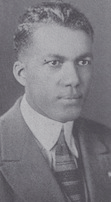Crunching History for Television
Last week I had the chance to tell a history story on Almanac, my local public television station’s weekly public affairs and news program. (You can view my segment here.) I accepted the producer’s invitation to appear on the show even though I knew that condensing a complicated history tale is fraught with peril.

Thanks to the talents of the producer, Brendan Henehan, and the program’s host, Cathy Wurzer, everything went well. In about seven minutes, I told the story of Homer Smith, an undeservedly forgotten black journalist of the 20th century who played a role in an undeservedly forgotten episode in the history of U.S.-Soviet relations and the beginnings of the civil rights movement. Smith was one of 22 young African Americans who traveled to the USSR in 1932 to appear in Black and White, a Soviet-sponsored propaganda film about race relations in America. I’ve been interested in (some would say obsessed by) Smith and his fellow would-be actors for decades, and I recently explored one aspect of the wondrous Black and White controversy in this article.
Smith remained in Russia for 14 years, working for a time as the only black reporter covering the eastern front during World War II. Then, after the war’s end, he escaped to Africa with the help of an Ethiopian diplomat and, after initial opposition from the State Department and the FBI, returned to the U.S. Once an enthusiast for the Soviet regime, he now wrote articles against it. He published a book about his experiences, Black Man in Red Russia, in 1964 but died practically unknown eight years later.
In my limited time on the air, my challenge was to be entertaining as I got across Smith’s journalistic skills, sketched the story of the Black and White film, and hinted at the complexity of his political turnaround. Most importantly, I had to convey why his life was significant.
The last point of Smith’s significance was especially hard, at least how I wanted to handle it, because it forced me to do some personal thinking. I believe all writers who investigate historical topics need to frequently ask themselves why they’re caught up in the tales they tell. Coming up with answers leads us down useful and surprising paths when we start writing and have to chisel topics into stories.
Luckily for me, Cathy’s questions kept me focused and moving ahead. I think Homer Smith’s story, as I told it on TV, is coherent. What do you think?
I am currently reading, “Black Man in Red Russia” and want to learn more about Homer Smith, especially the years after he left the Soviet Union. I was born in Minneapolis in 1948 and moved to the Pacific Northwest with my wife and two boys in 1988. Prior to moving I wrote a monthly history column for “Lakeside News” and did some archaeology on the West River Road project. Have never stopped reading and loving history. Your career is the career I could have had if I had focused on being a writer in a disciplined manner after I got out of the Air Force in 1971. Well done, you!
I’m retired now making abstract art and blogging for residents and visitors to Island County, on Whidbey Island..
Mike, thank you for your kind comment. A few years ago I wrote an article about Homer Smith, including new details about his last years. You can find it at https://www.minnesotaalumni.org/stories/homeland-insecurity
I hope you will find time to write about history, at least occasionally.
Best wishes, Jack